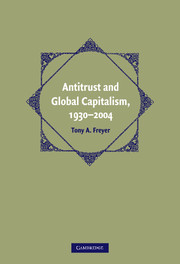Book contents
- Frontmatter
- Contents
- Acknowledgements
- Antitrust and Global Capitalism, 1930–2004
- Introduction
- 1 Reconstituting American Antitrust, 1937–1945
- 2 Protectionism over Competition: Europe, Australia, and Japan, 1930–1945
- 3 American Antitrust since 1945
- 4 Japanese Antitrust since 1945
- 5 Antitrust in Postwar European Social Welfare Capitalism
- 6 Antitrust Resurgence and Social Welfare Capitalism in Postwar Australia
- Conclusion
- Index
6 - Antitrust Resurgence and Social Welfare Capitalism in Postwar Australia
Published online by Cambridge University Press: 03 May 2010
- Frontmatter
- Contents
- Acknowledgements
- Antitrust and Global Capitalism, 1930–2004
- Introduction
- 1 Reconstituting American Antitrust, 1937–1945
- 2 Protectionism over Competition: Europe, Australia, and Japan, 1930–1945
- 3 American Antitrust since 1945
- 4 Japanese Antitrust since 1945
- 5 Antitrust in Postwar European Social Welfare Capitalism
- 6 Antitrust Resurgence and Social Welfare Capitalism in Postwar Australia
- Conclusion
- Index
Summary
The postwar internationalization of antitrust imposed accountability upon American managerial capitalism, gradually limited cultural collusion permeating Japanese capitalism, and integrated social market capitalism to establish a more unified European community. In Australia, by contrast, the political consensus supporting the postwar resurgence of Australian antitrust instituted an enforcement regime which contested the limits of efficient market competition and social welfare. Section I of this chapter emphasizes that the High Court's constitutional decisions favoring individual economic liberty preceded the better known campaign for a trade practices law identified with Liberal attorney general, Sir Garfield Barwick. Section II examines how R. B. Bannerman, the civil servant charged with implementing the weak law of 1965, worked to reshape the political consensus, reinforcing the success of Labor's attorney general, Lionel Murphy, in passing the stronger Trade Practices Act of 1974. Section III considers the maturation of an effective enforcement regime from 1974 to 1991 and its contribution to remaking the labor-capital settlement through microeconomic reform. Section IV explores how the activist trade practices regime associated with Allan Fels was enlarged to further the reform agenda.
POSTWAR AUSTRALIAN CAPITALISM AND CONSTITUTIONAL ECONOMIC LIBERTY
From 1945 to the mid-1960s, most Australian business interests broadly supported the market stability maintained through cooperation. The benefits of standardized products, quality control, and maximum output seemed more important than restricted entry, fixed prices, and such unfair practices as larger firms' refusing to deal with certain smaller ones on the basis of discrimination, rebates, and predatory pricing.
- Type
- Chapter
- Information
- Antitrust and Global Capitalism, 1930–2004 , pp. 315 - 392Publisher: Cambridge University PressPrint publication year: 2006



